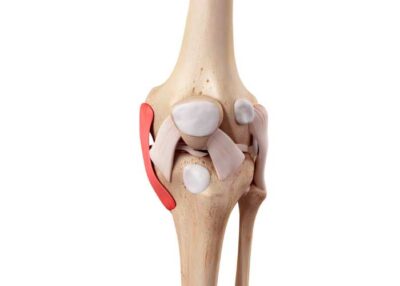MCL Reconstruction and Repair Surgeon

Are you an athlete who participates in contact sports? If so, you may be at risk of sustaining an MCL injury. The MCL can be injured from certain twisting movements, direct contact to the outside of the knee, or combined force impacts when knee flexion is present. MCL reconstruction surgeon, Doctor Riley J. Williams provides diagnosis as well as surgical and nonsurgical treatment options for patients in Manhattan, Brooklyn, New York City and surrounding areas who have suffered an MCL tear. Contact Dr. Williams’ team today!
What is the medial collateral ligament (MCL)?
The medial collateral ligament (MCL) is a tough band of tissue that stabilizes the knee joint and connects the bones that form the knee. It is similar to the anterior cruciate ligament (ACL), however, the MCL runs along the inside of the knee and connects the femur (thigh bone) and tibia (shin bone). The MCL allows the knee to rotate and is often referred to as the primary stabilizer of the knee because it prevents the knee from bending inward excessively. Injuries to the MCL can cause it to fray, tear or break completely. Certain actions, such as sudden directional changes when running, rapid twists, or forceful contact to the lateral (outer side) of the knee can cause a torn or broken MCL. Dr. Riley J. Williams, orthopedic knee surgeon, may recommend MCL reconstruction to his patients in Manhattan, Brooklyn, New York City, NY and surrounding areas who have suffered an MCL tear. Dr. Williams has extensive experience and success in treating knee injuries, especially medial collateral ligament (MCL) tears and in helping returning athletes to the sports they love.
What is MCL reconstruction?
Medial collateral ligament (MCL) reconstruction is a minimally invasive surgical treatment performed to replace the existing, torn MCL. Typically, this surgery is performed on patients who have experienced a severe or long-lasting MCL injury. During this surgery, Dr. Williams creates 2 small incisions in the knee and inserts an arthroscope (a small camera) to visualize the joint. The MCL reconstruction requires a small incision be made on the inner aspect of the knee. Dr. Williams typically repairs the damaged MCL if possible. The tissue used for the MCL reconstruction is placed over the primary MCL repair. Tissue grafts are used for MCL reconstruction. Tissues taken from a donor are called allografts; tissue taken from other areas of the patient’s body are called autografts. Dr. Williams uses extreme care and precision to place the new tissue graft in the exact location of the original medial collateral ligament. This ensures that once healed, the patient will be able to move, bend, and run as they did before the surgery. This graft is secured in place on the femur and the tibia with special surgical screws and anchors.
MCL reconstruction is not the only surgical option to fix an MCL tear. In less severe cases, especially in if the tear is incomplete, or only frayed, MCL augmentation or repair may be performed instead of MCL reconstruction. It is extremely important to speak with an experienced surgeon like Dr. Williams to ensure that you are receiving the best, most appropriate care for your particular knee injury.
What is medical cruciate ligament (MCL) repair?
MCL repair is a different surgical option than reconstruction for treating MCL tears. This option is often recommended in the case of complete grade 3 MCL tears in the acute. Primary MCL repairs are also performed in a setting where the ligament is still intact and has experienced a minor tear. This surgery, much like MCL reconstruction, is performed using a small incision on the inner knee. Dr. Williams positions the existing ligament and places sutures to reconnect and restabilize the tissues. Both MCL reconstruction and MCL repair are excellent options for restoring the stability of the patient’s knee and allowing them to return to their normal activities. Dr. Williams can give his patients in New York the best advice for which type of MCL treatment would be the most beneficial.
What are the risks?
Although MCL reconstruction is minimally invasive, there are a few risks associated with this surgery. Very rarely, patients may experience residual instability and stiffness in the knee. These symptoms may be paired with a decreased range of motion. In addition to this, patients may experience any of the following rare occurrences:
- Localized numbness
- Infection
- Failure or loosening of the graft
- Nerve damage
- Blood vessel damage
Strict adherence to Dr. William’s post-operative guidelines and instructions will substantially decrease the likelihood of any of the above issues. Most of Dr. Williams patients return to their full normal activities following surgery and physical therapy.
How long does it take to recover from MCL reconstruction surgery?
Recovery time from medial cruciate ligament (MCL) reconstruction surgery varies from patient to patient depending on the extent of the injury, the patient’s overall health, and their willingness to follow post-surgical guidelines. In general, Dr. Williams advises the use of a weight-bearing brace to help protect the knee for up to 6 weeks. Dr. Williams may have the patient use crutches throughout the first 2-3weeks, depending on the severity of the injury. Pain medication is also provided to the patient to aid in the healing process and should only be taken as directed. As tolerated, patients may begin to decrease the use of crutches and brace to allow the knee to become accustomed to bearing weight again.
Most importantly, Dr. Williams will outline a rehabilitation program for the patient, including stretches and physical therapy exercises the patient must follow. This program will help to regain the patient’s normal range of motion, as well as increase flexibility and regain muscle strength. These exercises are imperative for the best recovery. After a successful rehabilitation program, Dr. Williams will release the patient to participate in full sporting activities at about 4-6 months following surgery.
For more information about medial collateral ligament (MCL) reconstruction or repair or for additional resources regarding knee ligament injury treatments, please contact the office of Riley J. Williams, MD, orthopedic knee surgeon serving Manhattan, Brooklyn, New York City, NY and surrounding areas.
Locations
610 W 58th Street
New York, NY 10019
148 39th Street, 7th Floor
Brooklyn, NY 11232



